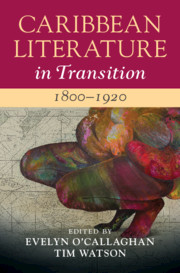Book contents
- Caribbean Literature in Transition, 1800–1920
- Caribbean Literature in Transition
- Caribbean Literature in Transition, 1800–1920
- Copyright page
- Contents
- List of Illustrations
- Contributors
- Acknowledgements
- Introduction
- Part I Literary and Generic Transitions
- Part II Cultural and Political Transitions
- Part III The Caribbean Region in Transition
- Part IV Critical Transitions
- Chapter 22 Creative Rewritings of Early Caribbean Texts
- Chapter 23 Digital Restaging of Early Caribbean Texts
- Chapter 24 Lost Mothers in the Caribbean Plantation and Contemporary Black Maternal and Infant Mortality
- Chapter 25 Reading the Colonial Archive through Joscelyn Gardner’s Creole Portraits I–III
- Bibliography
- Index
Chapter 23 - Digital Restaging of Early Caribbean Texts
from Part IV - Critical Transitions
Published online by Cambridge University Press: 16 December 2020
- Caribbean Literature in Transition, 1800–1920
- Caribbean Literature in Transition
- Caribbean Literature in Transition, 1800–1920
- Copyright page
- Contents
- List of Illustrations
- Contributors
- Acknowledgements
- Introduction
- Part I Literary and Generic Transitions
- Part II Cultural and Political Transitions
- Part III The Caribbean Region in Transition
- Part IV Critical Transitions
- Chapter 22 Creative Rewritings of Early Caribbean Texts
- Chapter 23 Digital Restaging of Early Caribbean Texts
- Chapter 24 Lost Mothers in the Caribbean Plantation and Contemporary Black Maternal and Infant Mortality
- Chapter 25 Reading the Colonial Archive through Joscelyn Gardner’s Creole Portraits I–III
- Bibliography
- Index
Summary
The digital restaging of early Caribbean texts includes critical efforts by scholars, librarians, archivists, and others working together to identify, locate, digitize, and put in place supports for online access and long-term digital preservation. Digital preservation and access to lost, rare, or hard-to-find literary archives have revolutionized Caribbean literary history and scholarship. This essay covers digital restaging in relation to concerns for access, the importance of scholarly bibliographies and collaboration for identifying literary texts for digitization and contextualization, and the importance of digital libraries in enabling the transition, focusing specifically on the Digital Library of the Caribbean (dLOC). This chapter concludes with the significance of digital humanities programmes and projects in Caribbean Studies for continuing the work of bibliographies and inventories.
Keywords
- Type
- Chapter
- Information
- Caribbean Literature in Transition, 1800–1920 , pp. 374 - 389Publisher: Cambridge University PressPrint publication year: 2021

